Search Results
Showing results 21 to 36 of 36

Soggy Science, Shaken Beans
Source Institutions
Learners explore soybeans, soak them in water to remove their coat, and then split them open to look inside. They also make a musical shaker out of paper cups, a cardboard tube, and soybeans.
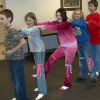
The Bug Walk
Source Institutions
In this fun group activity involving music and movement, learners are introduced to the idea that many insects walk by using their legs to create "alternating triangles." Learners sing the "Ants Go Ma
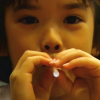
Oboe? Oh, Boy!
Source Institutions
In this activity, learners create a straw oboe to explore sound and pitch.
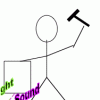
Lagging Sound
Source Institutions
In this group activity, learners see and hear the speed of sound. A learner designated the "gonger" hits a gong, once every second, as the rest of the group watches and listens from a distance.

CD Spectrometer
Source Institutions
In this activity, learners use a compact disc to make a spectrometer, an instrument used to measure properties of light.

Stereo Hanger
Source Institutions
In this activity, learners investigate sound wave science, in stereo! Learners construct a "stereo" out of a metal coat hanger and piece of string to explore sound vibrations.
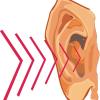
Good Vibrations
Source Institutions
In this activity, learners experiment with their voices and noisemakers to understand the connections between vibrations and the sounds created by those vibrations.
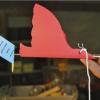
Chirping Bird
Source Institutions
In this activity, learners build a cuica or chirping bird using straw, string, and a bottle cap. Use this activity to explore the interplay of motion and sound.
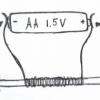
Make a Speaker
Source Institutions
In this activity, learners explore how an electromagnet works by making a simple one. Using this knowledge, learners design a diagram to make a working speaker using household materials.

Fun with Flatware: Little Experiments to Try at the Dinner Table
Source Institutions
This is a series of three quick science activities to do with a spoon, knife, and fork. In the first two activities, learners use the flatware to explore optics, mirrors, reflection, and distortion.

Super Sounding Drum
Source Institutions
In this activity, learners construct drums out of everyday containers (like bowls or food containers) and shrink wrap. Learners use a hair dryer to affix and tighten the shrink wrap to the container.
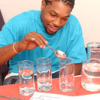
Real Glass Xylophone
Source Institutions
In this activity, learners create a xylophone by filling glasses with different amounts of water and tapping them with a metal spoon.
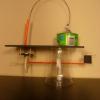
Sound Automata
Source Institutions
In this activity, learners build their own sound machines and explore the interplay of motion and sound.
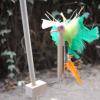
Woodpecker
Source Institutions
In this activity, learners construct a traditional handicraft toy that illustrates a motion commonly associated with violins and earthquakes.
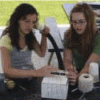
Headphone Helper
Source Institutions
In this design challenge activity, learners add headphones to a previously built instrument (see "Build a Band" activity) to make it easier to hear.

AM in the PM
Source Institutions
In this activity, learners will listen to as many radio stations as possible to discover that AM radio signals can travel many hundreds of miles at night.
